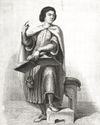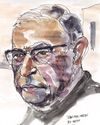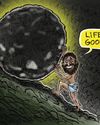
If you've never read Heraclitus's book, then you share something in common with every modern scholar of his work: we only have fragments. Unfortunately, so little of his writing survives that it is difficult to piece together the life and opinions of this intriguing philosopher. This is what makes studying him partly so easy, and partly so difficult: you can read all the surviving fragments in an hour, then puzzle over them for the rest of your life.
We may never understand Heraclitus's philosophy in detail, but I hope by the end of this article to introduce you to some of the themes that survive, to what recent(ish) philosophers have said about them, and to what we can learn from them today.
Life
Most of what we know about Heraclitus's life comes from the biographer of philosophers Diogenes Laertius (not to be confused with the other Diogenes, the urn-dwelling Cynic) who wrote in around 225 AD, more than seven hundred years after Heraclitus's time. Laertius was notorious for regurgitating without critical reflection previous sources, ranging from comic poems, to earlier biographies, to that ever-popular source 'according to some'. Therefore take the following with a large pinch of Ionian sea salt.
Heraclitus was born in the Greek city-state of Ephesus, on the coast of modern-day Turkey, and he flourished around 500 BC, which is about thirty years before Socrates was born. The surviving anecdotes of his life are all rather whacky: the picture we're left with is of an arrogant eccentric who hated common wisdom and the authorities of his time to the point of self-isolation. Despite being born in Ephesus, he seems very critical of the city. After his friend Hermodorus was exiled from it, he claimed that the Ephesians all deserved to die to a man, and ought to leave the city to the young.
Diese Geschichte stammt aus der June/July 2024-Ausgabe von Philosophy Now.
Starten Sie Ihre 7-tägige kostenlose Testversion von Magzter GOLD, um auf Tausende kuratierte Premium-Storys sowie über 8.000 Zeitschriften und Zeitungen zuzugreifen.
Bereits Abonnent ? Anmelden
Diese Geschichte stammt aus der June/July 2024-Ausgabe von Philosophy Now.
Starten Sie Ihre 7-tägige kostenlose Testversion von Magzter GOLD, um auf Tausende kuratierte Premium-Storys sowie über 8.000 Zeitschriften und Zeitungen zuzugreifen.
Bereits Abonnent? Anmelden

The Two Dennises
Hannah Mortimer observes a close encounter of the same kind.

Heraclitus (c.500 BC)
Harry Keith lets flow a stream of ideas about permanence and change.

Does the Cosmos Have a Purpose?
Raymond Tallis argues intently against universal intention.

Is Driving Fossil-Fuelled Cars Immoral?
Rufus Duits asks when we can justify driving our carbon contributors.

Abelard & Carneades Yes & No
Frank Breslin says 'yes and no' to presenting both sides of an argument.

Frankl & Sartre in Search of Meaning
Georgia Arkell compares logotherapy and atheistic existentialism.

Luce Irigaray
Luce Irigaray, now ninety-two years old, was, among many other things, one of the most impactful feminists of the 1970s liberation movements - before she was marginalised, then ostracised, from the francophone intellectual sphere.

Significance
Ruben David Azevedo tells us why, in a limitless universe, we’re not insignificant.

The Present Is Not All There Is To Happiness
Rob Glacier says don’t just live in the now.

Philosophers Exploring The Good Life
Jim Mepham quests with philosophers to discover what makes a life good.